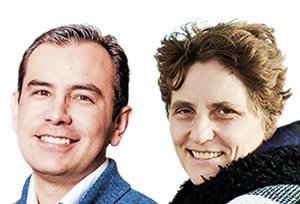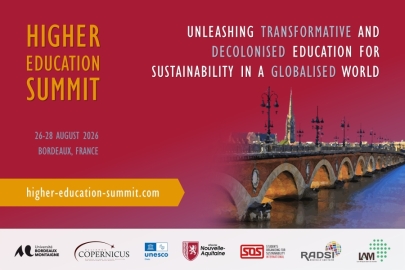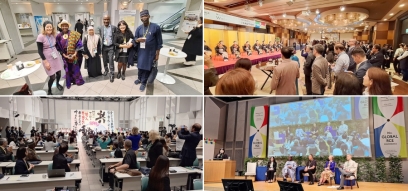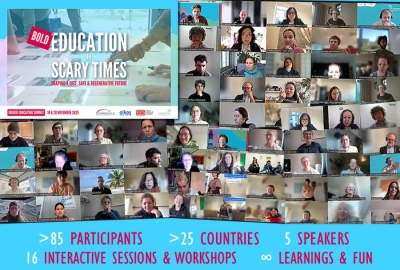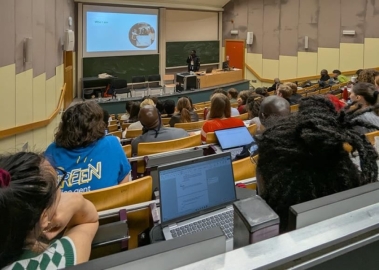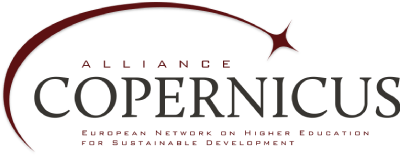#3 10/2019
Jorge Ricardo Nova Blanco
Catalyzer of transdisciplinary efforts at KU Leuven
Anne-Mieke Vandamme
Silo-culture-questioning virologist at KU Leuven
| _ |
"We are living in a transition period of history that pushes us to re-think the way in which we are living, doing research and education." |
Ingrid Mulà (IM) Last February, Anne Zimmermann, Mario Diethart and I had the pleasure to speak with you, Annemie, about KU Leuven and the amazing “Transdisciplinary Insights” initiative led by the Institute for the Future. It is great that you and your colleague Jorge have agreed to participate in this CA conversation. Can you tell me how this initiative was born and how it has evolved over time?
Anne-Mieke Vandamme (AV) Over the last decades, I had been growing increasingly frustrated about the inertia in political decision making with regard to urgent and major problems in society, despite sufficient scientific evidence of their size and urgency, the biggest example being climate change. I had not seriously considered that I could do something about it, I was in this academic rat race where my research funding depended entirely on the grants I could bring to the lab, and that in turn depended on my publication output, you know, publish or perish.
During my sabbatical year in 2012, I took time to think about what were the most important contributions I could make to what I saw were the most pressing problems. I realized that scientific facts on their own are not sufficient. If the facts were not accompanied by commitment to act from many different stakeholders, we would always run behind the facts. Talking to many other researchers in my own and other disciplines, I had the feeling that many like-minded researchers were converging on the problem of lack of integration of knowledge from different fields, and lack of integration of the experience of societal actors. So I naturally ended up looking at transdisciplinary methodologies, and the barriers for such methods because of the silo culture at universities.
Inside and outside of academia I discussed at length the idea of overcoming these barriers by creating an institute for addressing complex problems with teams of researchers from different disciplines. I received positive feedback and inspiring ideas for developing such an institute. However, because of multiple commitments at my work and some initial resistance from academia, it was not possible for me to develop the Institute after my sabbatical year.
One of these people I talked to was Jorge, a business manager whom I had met during my sabbatical. I liked the natural way in which he supported me in my search; he has this spirit of supporting people's dreams to come true.
Jorge Ricardo Nova Blanco (JRNB) Annemie introduced me to the idea of such an institute in 2013. I very much liked the concept of bringing together different disciplines and stakeholders on the development of solutions to complex problems. However, it was only in 2016 when we discussed it further that I started a collaboration for developing the concept. One of our first activities was to set up a core team of professors from different disciplines willing to bring in their expertise, time, and effort on the development of the Institute. Prof. Andreas De Block (group for humanities and social sciences), and Prof. Griet Ceulemans (group for science and technology), accepted the invitation to cooperate. With the support of Annemie (group for biomedical sciences), the four of us cover the three groups of sciences at the university, and we work actively together to co-create this Institute for the Future and the Honours Programme.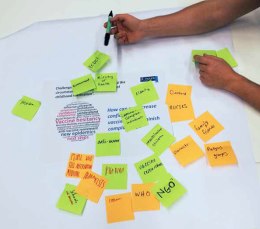 Curiously, after the core team was consolidated, the university launched a call for developing an honours programme and invited us to submit a proposal. That was when the four of us realized that the research and educational aspect of our initiative go very well together. So we proposed an honours programme where teams of students are doing the transdisciplinary research based on challenges submitted for example by societal stakeholders. The Educational Committee of the KU Leuven approved the Honours Programme Transdisciplinary Insights as an extracurricular activity for master students university-wide. I consider that as a starting point.
Curiously, after the core team was consolidated, the university launched a call for developing an honours programme and invited us to submit a proposal. That was when the four of us realized that the research and educational aspect of our initiative go very well together. So we proposed an honours programme where teams of students are doing the transdisciplinary research based on challenges submitted for example by societal stakeholders. The Educational Committee of the KU Leuven approved the Honours Programme Transdisciplinary Insights as an extracurricular activity for master students university-wide. I consider that as a starting point.
Our first pilot course was during the second semester of the academic year 2016/2017. A consultant of the WHO submitted the challenge of HIV drug resistance in Africa; seven students from different disciplines decided to collaborate during the pilot course. We involved several stakeholders, including research centers, government, and NGOs from different parts of the world. The output of the challenge was published in the e-journal Transdisciplinary Insights, which we had created as a repository for the students’ work.
The approach and output of the pilot programme were so impressive that the following academic year we had four challenges running, in such diverse topics as equitable society, vaccine hesitancy, Down syndrome and HIV drug resistance. Several students from different faculties contributed to the programme, as well as local and international stakeholders. Moreover, one student started a PhD on the HIV drug resistance challenge.
We have just finished the Honours Programme Transdisciplinary Insights 2018/2019 edition. It was a great experience to work on the challenges with students (BA, MSc, PhD), professors, and stakeholders. Thanks to their efforts, we have grown.
IM So this initiative brings together community stakeholders, academic staff and students to define societal challenges and explore wicked problems through a transdisciplinary approach. This is truly societally-driven research in the context of education – a very rare thing: It certainly requires a great deal of trust between the university, those in charge of the programme and the participating stakeholders. What role does each stakeholder play, and what do you think they take away from participating? It would be great to hear about some of their learning experiences, but also knowing the challenges you face taking into account that you are really challenging current higher education learning and research systems.
JRNB Each stakeholder plays a different role according to the challenge. Some stakeholders support the challenge actively by guiding a team on co-creating an alternative solution to the problem, while others are providing their expertise on specific discussions or confronting the insights developed by the team. In both cases, they contribute to the challenge because of their intrinsic motivation on the topic and need to think out of the box to find alternative and sustainable solutions.
Developing the Institute for the Future and the Honours Programme Transdisciplinary Insights has been a constant learning experience not only for us but also for the coaches of the programme, stakeholders, students and the University. I think that one positive aspect is that everyone knows that we are exploring and testing alternative approaches to research and education. Therefore, we receive constant feedback from BA, MSc or PhD students, professors, researchers, research centers, government, profit and non-profit organizations.
In general, all agree that it is necessary to work on a transdisciplinary manner to come up with alternative solutions for the benefit of the common good.
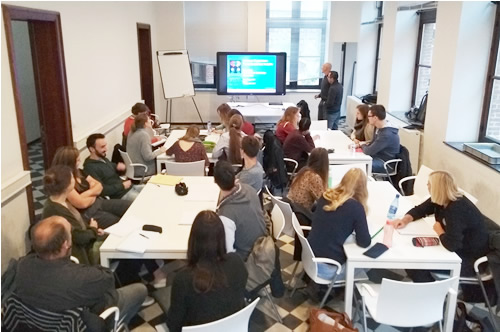 AV We are building the honours programme while doing it, and it is improving along the way, thanks to the multitude of critical feedback we get. We are very open about this program being an experiment. The students from the pilot year had, for example, the task of writing down how they experienced the process and suggest improvements, which were then implemented and tested. It has been a very inspiring but difficult journey. We continuously had to work around obstacles, because with the current structures at the university, truly transdisciplinary research is not straight forward. The entire university is organized in three different groups of sciences, and structures that support this cross-disciplinary approach are only now being created. The biggest problem is the lack of funding schemes for transdisciplinary projects. Current funding schemes are designed for promoting mono-, multi-, and to some extent also interdisciplinary research projects. Only recently, funding agencies started to realize the importance of transdisciplinary research. We have been invited to think with them about developing funding schemes that benefit this approach in education and research. However, the discussion is still at an early stage.
AV We are building the honours programme while doing it, and it is improving along the way, thanks to the multitude of critical feedback we get. We are very open about this program being an experiment. The students from the pilot year had, for example, the task of writing down how they experienced the process and suggest improvements, which were then implemented and tested. It has been a very inspiring but difficult journey. We continuously had to work around obstacles, because with the current structures at the university, truly transdisciplinary research is not straight forward. The entire university is organized in three different groups of sciences, and structures that support this cross-disciplinary approach are only now being created. The biggest problem is the lack of funding schemes for transdisciplinary projects. Current funding schemes are designed for promoting mono-, multi-, and to some extent also interdisciplinary research projects. Only recently, funding agencies started to realize the importance of transdisciplinary research. We have been invited to think with them about developing funding schemes that benefit this approach in education and research. However, the discussion is still at an early stage.
Ideally, every student should have had at least one experience in transdisciplinary research. Right now it is not even in the regular curriculum. Even if the interest of the student is to profoundly specialize in one discipline, it is good to at least know what stakeholders are thinking, and that they have a lot of knowledge that can be useful. The way we have set up the honours programme, it is not easy to scale it up. We are looking for experiences that could help us, perhaps among your readers?
Other universities have shown interest in developing asimilar concept as the Institute for the Future or developing further synergies with us. To some extent, this is positive feedback for us and helps us to develop our model further and co-create a better institute. It would be nice if we could bridge to other universities or research institutes, for example by setting up mixed teams. That would be especially interesting if the challenge is related to other countries, or if the wicked problem could be approached differently in different settings. This is for now still a dream, but who knows what the future brings.
IM I am interested in knowing how you define the challenges that will be investigated. Is there a process that you undertake each academic year, and how do you know that the challenge defined is worthwhile exploring? I’d also love to know how you do it to keep the teams actively engaged in learning in such an innovative approach. I guess that you are also very creative in the way you support them!
AV We have launched a bank of transdisciplinary challenges in which everyone can propose a challenge. We don’t lack submissions! When we talk about it with other researchers or with people from different organizations, or even with family or friends, we see there is no lack of challenges for our initiative, and often, such contacts end up with a challenge being submitted. Once submitted, we look at it with the academic board to verify whether the challenge has a need for different disciplines and stakeholders, and whether it fits within the sustainable development goals as an ethical framework, among other aspects. The academic team provides support for framing the challenges in a transdisciplinary manner with the support of the challenge submitter. Then, it is a process of finding a coach, and involving stakeholders, partners, students, and scholars on it. When everything is ready, we start with the exploration of the challenge. In my mind, if there are stakeholders and experts willing to invest time in the challenge, if we find a coach to guide the students, and if enough students are interested in working on it for a year, then the challenge is worthwhile exploring. I don’t want us to be the gatekeepers that say what can and cannot be explored. We try to start projects, provide fertile ground, and are amazed every time by everyone’s commitment and the exciting new ideas that pop up.
JRNB Each topic is fascinating, as are the people involved in it! Each team has its personality in a unique sub-system. Sometimes groups spend a lot of time grasping the complexity of the problem rather than reaching a solution, while in other cases the process is faster and small steps towards a solution are already taken by the team. I would say that the key factor for the engagement is the intrinsic motivation of coaches, students, and stakeholders.
We are learning a lot from each team in each challenge. Therefore, we continuously ask them for feedback and we try to implement the ideas as good as we can. Nevertheless, all people involved know that it is a new model; so, there is room for constant improvement.
IM I am sure that you are already thinking about next steps and how to scale up this initiative. Can you share some of your future plans?
JRNB First, we would like to consolidate our approach at the KU Leuven. Then, we would like to share the concept of the incubator model on transdisciplinary research with other universities in Belgium and Europe. We are working with partners and the core team on developing the best strategy to scale upour approach. We are co-creating the Institute for the Future.
IM Finally, and this is just curiosity: What brought a biochemist (Annemie) and an architect and business manager (Jorge) together to start talking about transdisciplinarity and sustainable development? How do you think we can start breaking barriers between disciplines and support transdisciplinary dialogues for sustainability at the university level?
AV Good question! Well, our first discussion was quite a long time ago. I cannot recall the topic completely. Somehow, we found common ground on the question about what type of world we are currently developing and what kind of world we want to give to our current and future generations. That question is one way to create awareness between disciplines that helps to break the barriers among them and society.
JRNB I think that the first step for breaking barriers between disciplines is to be aware that we have only one planet and one life. We are living in a transition period of history that pushes us to re-think the way in which we are living, doing research and education. The future is in our hands!
IM These are nice closing words. Hopefully your ideas will spread across Europe – thank you for sharing them with our community!
Contact Jorge Ricardo Nova Blanco:
Contact Anne-Mieke Vandamme:
Download full conversation as pdf

